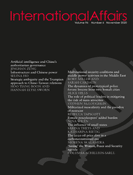-
PDF
- Split View
-
Views
-
Cite
Cite
Rennie A. Silva, The last brahmin: Henry Cabot Lodge Jr. and the making of the Cold War, International Affairs, Volume 96, Issue 6, November 2020, Pages 1691–1693, https://doi.org/10.1093/ia/iiaa196
Close - Share Icon Share
Henry Cabot Lodge Jr is, by most measures, a forgotten figure. Writing on his life is scant; no building bears his name; neither the galleries of the US Capitol nor the hallways of the Department of State feature any trace of him. Lodge possessed the gravitas of a secretary of state, was nearly elected vice-president, and was almost drafted to run for president. Yet he somehow faded from public memory long ago.
The last brahmin brings the patrician diplomat back into focus. Born at the twilight of the Gilded Age into a family that spoke with a transatlantic accent and viewed its influence over the country's most powerful institutions as a foregone conclusion, Lodge possessed a singular sense of noblesse oblige. At a glance, his résumé reads like the lyrics to Billy Joel's ‘We didn't start the fire’: Lodge was a senator amid the rise of McCarthyism; permanent representative to the UN during the Suez Crisis; vice-presidential running mate to Richard Nixon; ambassador to Saigon during the overthrow of Ngo Dinh Diem; and envoy to the Vatican during the papacy of Paul VI. He won the 1964 New Hampshire Republican presidential primary without declaring himself a candidate, advised President Johnson on Vietnam and led President Nixon's peace negotiations in Paris.
Few other figures of the Cold War served in as many roles or wielded as much influence as Lodge did. Yet he started out as a sceptic of an expansive international role for the United States. Raised by his grandfather, a senator who bitterly opposed the foreign policies of Woodrow Wilson, he initially followed in his footsteps. After winning election to the Senate in 1936, Lodge spoke out against FDR's plans to aid Great Britain as the Second World War engulfed Europe. But when the United States eventually entered the conflict, Lodge became the only member of the chamber since Reconstruction to resign and fight. His service on the front lines persuaded him that America could not retreat from the challenges it faced around the globe.
Most importantly, the war acquainted Lodge with a man who he believed could rally the country around their shared vision of collective security. His bet on General Dwight Eisenhower was hardly a sure thing––the GOP's base was then deeply resistant to America's burgeoning role in the world. The early front runner for the 1952 Republican presidential nomination, Senator Robert Taft, had resisted US entry into the war, opposed the Nuremburg Trials and voted against the creation of NATO, the World Bank and other multilateral institutions. Convinced that only a figure with Eisenhower's unrivalled stature could defeat Taft and conquer the GOP's recalcitrant isolationist wing, Lodge became committed to drafting him into the race and managing his ultimately successful campaign for the presidency. Eisenhower's eventual triumph would forge a bipartisan foreign policy consensus that was to endure for the remainder of the twentieth century––an achievement for which much of the credit goes to Lodge.
Lodge's own career in the Senate ended when the Massachusetts scion lost his seat to John F. Kennedy. But as the door to Congress closed, a door to the president's cabinet opened. The grandson of the man who doomed Woodrow Wilson's vision for the League of Nations would become the longest serving US ambassador to the United Nations in history, a record that remains today. Though he often bore the brunt of bellicose rhetoric from the USSR, Nichter highlights occasional moments of levity, such as when Lodge, as he led Nikita Khrushchev on a tour of the United States, got stuck with the portly Soviet premier and four other people in a lift between the 33rd and 34th floors of the Waldorf Astoria hotel. After climbing out, the notoriously combative Khrushchev ribbed the ever-affable Lodge: ‘This is the famous American technology!’ Lodge also used his perch at the UN to support the barrier-breaking career of black diplomat Ralph Bunche and push for greater diversity in America's diplomatic corps––a challenge for the US Foreign Service that persists to this day.
Lodge lost to Kennedy a second time in 1960. However, when the new president asked him to serve as ambassador to South Vietnam, he did not hesitate to accept what was then the most sensitive diplomatic posting in the world. Drawing on a newly discovered recording of Lodge's conversation with Kennedy in the Oval Office on the eve of his departure for Saigon, Nichter shows the extent to which Kennedy anticipated the overthrow of South Vietnam's president and authorized his envoy to sanction the coup.
Lodge's place in history would become, in a sense, a casualty of Vietnam. His involvement in the Diem affair came to overshadow the rest of his career; more broadly, the war would lead to a precipitous decline in the American public's trust in the establishment that Lodge embodied. He was indeed the last of his kind: Lodge's brand of liberal Republican internationalism fell out of fashion decades ago, the political class he personified no longer exists and the isolationism he once helped vanquish has again come to the fore of US politics. Yet as Luke Nichter has revealed, we still very much live in the world Lodge helped create. With the arrival of The last brahmin, his contributions to American statecraft may finally be recognized in full.
Author notes
The views expressed are the author's own and do not necessarily represent those of the US government.



